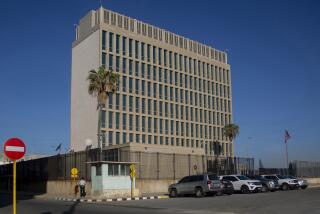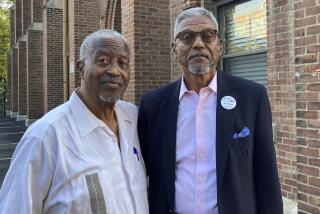Medical Panel Can’t Pin Cause of Gulf War Illness
- Share via
WASHINGTON — Thousands of veterans who have suffered from so-called Gulf War illness may never know whether their ailments stemmed from exposure to a group of suspected substances, a blue-ribbon medical panel said Thursday.
In a report that may trouble some ailing veterans of 1991’s Persian Gulf War, a committee of the Institute of Medicine said that not enough data exist to determine whether the syndrome is attributable to the substances.
“We’d like to give the veterans and their families definitive answers, but the evidence is simply not strong enough,” said Dr. Harold C. Sox Jr., chairman of the committee of 18 specialists. “Without data on the levels of exposure in the Persian Gulf theater, answers will remain elusive.”
The suspected substances studied by the group were sarin nerve gas, depleted uranium, anthrax and botulinum vaccines, and a nerve gas antidote called prydostigmine bromide, or PB.
Since Gulf War veterans began coming forward with health complaints in the early 1990s, the government has mounted a huge research effort--now consisting of 196 studies--to explore the ailments. Some 70,000 veterans have said they suffer from joint pain, fatigue, memory loss, digestive troubles and other ailments.
But the committee’s report suggested that many of the veterans may never find answers on suspected causes. And as long as the causes are not pinpointed, veterans’ advocates worry that some of those suffering from undiagnosed illnesses may not receive adequate government compensation.
The institute is an arm of the National Academy of Sciences, an independent agency chartered by Congress to advise the government. The study, sponsored by the Department of Veterans Affairs, examined the five substances based on recommendations of Gulf War veterans.
Of the 690,000 troops who participated in the war, about 250,000 were given PB tablets to counteract the effects of nerve gas attacks that officials feared might be ordered by Iraqi President Saddam Hussein. It is not clear, however, how many actually took the pills.
Troops also were vaccinated against anthrax and botulinum toxin because of fears that the Iraqi dictator also might launch a germ warfare attack.
Depleted uranium is used in tanks and shells to make them extra hard. Some U.S. tanks caught fire or exploded during the war, raising fears that troops inhaled or ingested tiny particles of the substance.
Hussein also stockpiled sarin gas. Defense officials believe that some U.S. troops may have been exposed to the gas when they destroyed caches of it at the war’s end.
Institute of Medicine researchers said that poor military record-keeping made it impossible to determine with any precision which troops were exposed to these substances or the extent of exposure in known cases.
The committee said that it examined studies of the suspected substances but that they also yielded little. For instance, it reported that evidence on sarin was “limited” or only “suggestive of an association” with long-term ailments.
A lack of long-term studies on the vaccines made it impossible to judge whether they might be a source of the illnesses, the committee said.
Its report said that evidence on PB and depleted uranium was so limited that no conclusions could be drawn about possible effects on health.
Sox, the panel’s chairman, said the study underscored the need for the military to keep better records on troop movements and exposure to potentially dangerous substances. “We’ve found that we’ve got to do better next time . . . to record what happens to soldiers in combat,” he said.
As concern grew over ailments possibly linked to the Gulf War, the Department of Veterans Affairs declared that some veterans would be eligible for compensation for “undiagnosed illnesses” deemed service connected.
But Steve Smithson of the American Legion’s Gulf War Task Force said a relatively small number of Gulf War veterans--about 3,040--have been included in this group. He said that in the absence of officially recognized links between the suspected substances and the illnesses, some doctors would diagnose veterans’ illnesses as other medical problems, effectively denying them compensation.
Smithson said he held out hope that later research might uncover more answers on the role of the substances. But he acknowledged that the study is bound to disappoint veterans who have been yearning for more definitive answers.
“A lot of questions weren’t answered,” he said.
More to Read
Sign up for Essential California
The most important California stories and recommendations in your inbox every morning.
You may occasionally receive promotional content from the Los Angeles Times.














